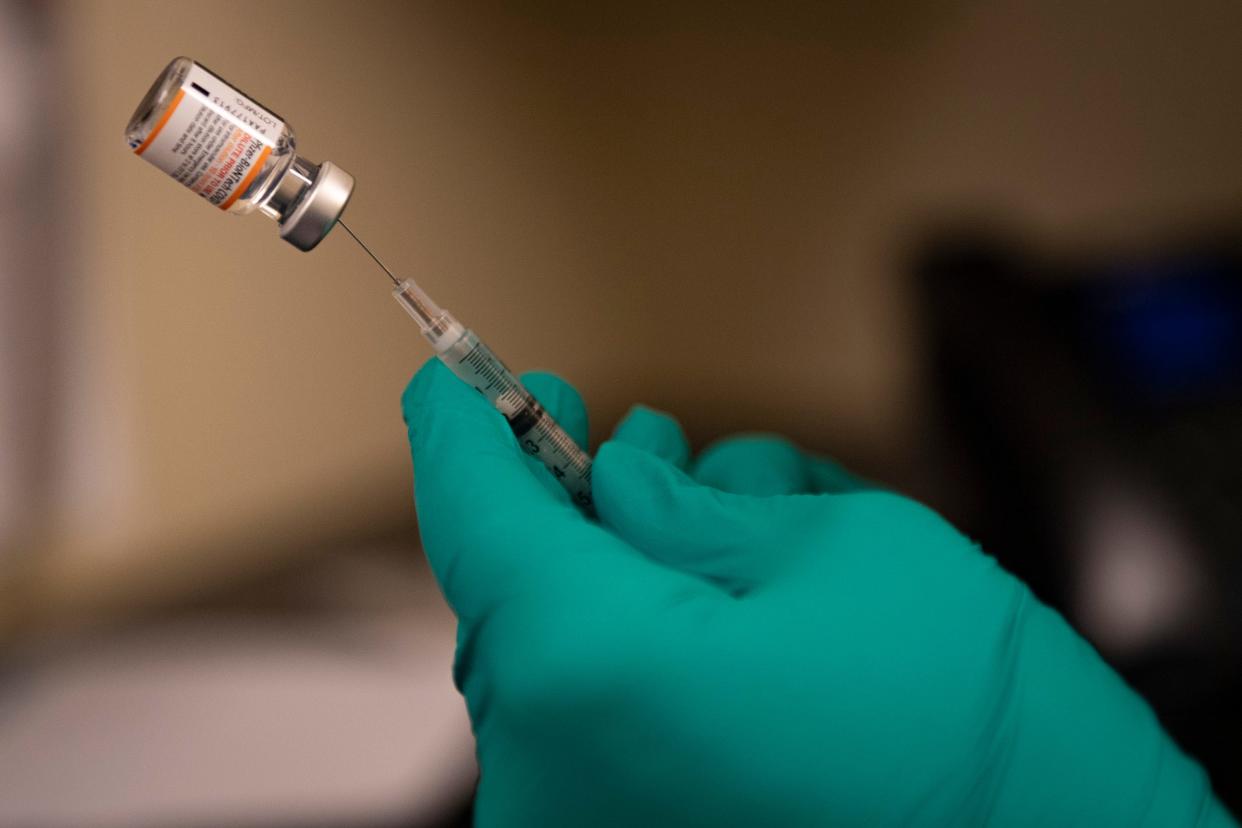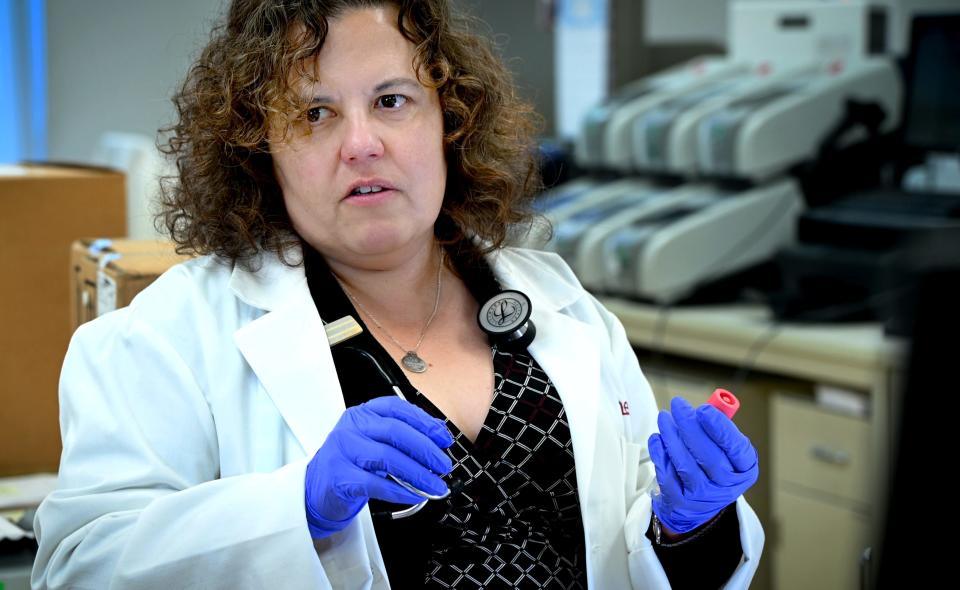Here's what Northern Colorado health officials say about flu, COVID and RSV outlook

- Oops!Something went wrong.Please try again later.
As Northern Colorado starts to see a slight uptick in COVID-19 cases, health officials are concerned about an early arrival of flu and respiratory syncytial virus creating a possible trifecta of illness in coming months.
This year, three vaccines are expected to provide protection against COVID, the flu and, for the first time, RSV.
Flu and RSV, which typically peak in December, are expected to arrive in October and possibly peak in November based on models from the southern hemisphere, said Dr. Michelle Barron, senior medical director of infection prevention and control at UCHealth.
In Australia, cases of all three viruses increased simultaneously, reaching higher-than-average levels and causing significant concern, Barron said.
“It was a rough couple of months seeing all three of those viruses at the same time, and children seem to have been affected by the flu-and-RSV combination more this year in Australia than in previous years,” she said. “This is why we’re encouraging everyone, and especially kids, parents and grandparents, to get their vaccinations early.”

New RSV treatment, vaccines offer hope for more protection
Last year, RSV swept through Northern Colorado, creating long wait times at pediatric urgent care clinics, doctors' offices and emergency departments overrun with little ones suffering from the virus that can make it hard to breathe.
“RSV is known to cause ‘croup’ in kids," Barron said. "In adults, it can cause bronchitis and pneumonia in individuals who are older or have underlying lung disease like asthma or COPD (chronic obstructive pulmonary disease), or have compromised immune systems due to medications or underlying conditions."
Nirsevimab, a new monoclonal antibody treatment designed to protect infants and young children at risk from severe RSV, has been approved by the Food and Drug Administration for use this year. It provides protection for at least five months, but immune protection will wane over time, according to the Centers for Disease Control and Prevention.
All infants younger than 8 months who are born during — or entering — their first RSV season should receive one dose, Barron said. The CDC recommends children between 8 and 19 months who are at increased risk of severe RSV disease get a dose at the start of their second RSV season.
An additional vaccine that is awaiting final approval targets women in their third trimester of pregnancy, Barron said. The vaccine helps the mother develop antibodies that cross over to the fetus and newborn.
Symptoms of RSV can range from mild to severe and can include cough, runny nose, fever, wheezing, decreased appetite, sneezing and congestion. In babies younger than 6 months, the only RSV symptoms they may show are irritability, decreased activity or appetite, and difficulty breathing.
While the symptoms can be terrifying for parents watching their babies struggle to breathe, RSV is rarely fatal, with most children recovering within a few days. Generally, symptoms tend to peak on days three through five.
The RSV vaccine for people over 60 is not available quite yet but Barron recommends getting the shot as soon as it is.
COVID-19 cases tick upward, but 'still very low activity'
As of Wednesday, Aug. 30, UCHealth's Northern Colorado hospitals were treating 10 patients with COVID-19, spokesperson Kelly Tracer said.
But the number of positive cases are certainly higher. "We don't know what the true COVID numbers are, since most people are home-testing now," and not necessarily reporting positive tests to county or state health officials, Barron said. "It may be more widespread than we are able to acknowledge."
Larimer County's health department is no longer monitoring COVID cases, but it continues to do wastewater monitoring. "We can see there have been upticks in COVID-19 activity," said spokesperson Kori Wilford.
"This trend in transmission is likely to continue to increase because of a combination of waning immunity, new variants and seasonality," she said. "These upticks, however, are occurring when we're seeing the very lowest rates of hospitalizations and still very low activity relative to all other periods of this pandemic, even with virtually zero precautions being taken."
Hospital admissions remain low at 1.7 new admissions per 100,000, she said.
A new COVID-19 vaccine focusing on the XBB 1.5 Omicron variant is expected to be available by the end of September. “The new COVID-19 vaccine has been changed to target a more current version of the virus in the community. This is similar to what is done for flu shots every year. There are no new safety issues or concerns with this new vaccine,” Barron said.
Flu shots arriving within days
Flu shots should also be available within days. Barron recommended getting each vaccine as it becomes available rather than waiting to get them concurrently.
Banner Health's scheduled flu shot clinics begin Sept. 12.
The CDC just released what strains are in the flu vaccine and it "looks like what it is supposed to be," Barron said. But, predicting strains of flu is like racehorses, she said. "All odds are on the favorite, but the horse with 100 to 1 odds ends up winning."
That being said, "we know that vaccines work, and we have repeatedly seen this in recent years," Barron said. "Even if a vaccine doesn’t completely prevent you from getting sick, it will reduce the severity of the illness and reduce the chance that you could end up in the hospital."
For COVID, medications like Paxlovid and Remdesivir are still available and have been proven to be effective in lowering the risk of severe infection, according to UCHealth. Monoclonal antibodies are no longer considered effective in the treatment for COVID-19.
"Staying healthy should be a priority for everyone, and getting a flu vaccine, COVID-19 vaccine and an RSV vaccine (if you are eligible) is a great way to meet that goal,” Barron said.
RSV symptoms
Keep a close eye on your baby if you notice any of the following: coughing, runny nose, wheezing, decreased appetite, sneezing, fever or congestion. In babies younger than 6 months, the only RSV symptoms they may show are irritability, decreased activity, decreased appetite and difficulty breathing.
COVID-19/flu symptoms
COVID-19 symptoms can look similar to that of the flu — headache, runny nose, body aches, fever, cough and a sore throat. If symptomatic, it is important to still get tested to determine what virus you have and what treatment options are best, Barron said.
Ways to stay healthy
Coloradans can help reduce transmission of RSV, the flu and COVID in several ways:
Stay home when you are sick, including not visiting or interacting with people who may be at higher risk, including older adults, young children and infants.
Frequently wash your hands with soap and water or use an alcohol-based hand sanitizer with at least 60% alcohol.
Cover your nose and mouth with a tissue or upper-arm sleeve when you cough or sneeze.
Clean potentially contaminated surfaces, like doorknobs, tables, handrails, etc.
Avoid sharing cups, eating utensils and touching your face with unwashed hands.
If your child is demonstrating early signs of respiratory distress, consider taking them to their primary care doctor for evaluation.
Source: Centers for Disease Control and Prevention
Scheduled Banner Health flu shot clinics in Fort Collins, Loveland and Johnstown
Sept. 12: 4-5:30 p.m., Fort Collins Medical Center main entrance, 4700 Lady Moon Drive.
Sept. 20: 7:30-9 a.m., Johnstown Family Physicians, 222 Johnstown Center Drive
Sept. 27: 4-5:30 p.m., McKee Wellness Office, No. 6, 1805 E. 18th St., Loveland
Oct. 4: 7-9 a.m., McKee Wellness Office, No. 6, 1805 E. 18th St., Loveland
Oct. 18: 7:30-9 a.m., Johnstown Family Physicians, 222 Johnstown Center Drive
Oct. 19: 4-5:30 p.m. McKee Wellness Office, No. 6, 1805 E. 18th St., Loveland
Oct. 25: 4-5:30 p.m., Fort Collins Medical Center main entrance, 4700 Lady Moon Drive, Fort Collins
Nov. 1: 7-9 a.m., McKee Wellness Office, No. 6, 1805 E. 18th St., Loveland
Nov. 9: 4-5:30 p.m., McKee Wellness Office, No. 6, 1805 E. 18th St., Loveland
Patients interested in receiving a flu shot can pay with cash, credit card, check or Medicare Part B (card required).Flu shots are $35. Vaccinations for Tdap (tetanus, diphtheria and pertussis) ($67) and tetanus ($47) are alsoavailable. Call 970-810-6633 for more information.
This article originally appeared on Fort Collins Coloradoan: Larimer County health officials watch for flu, RSV, COVID resurgence

